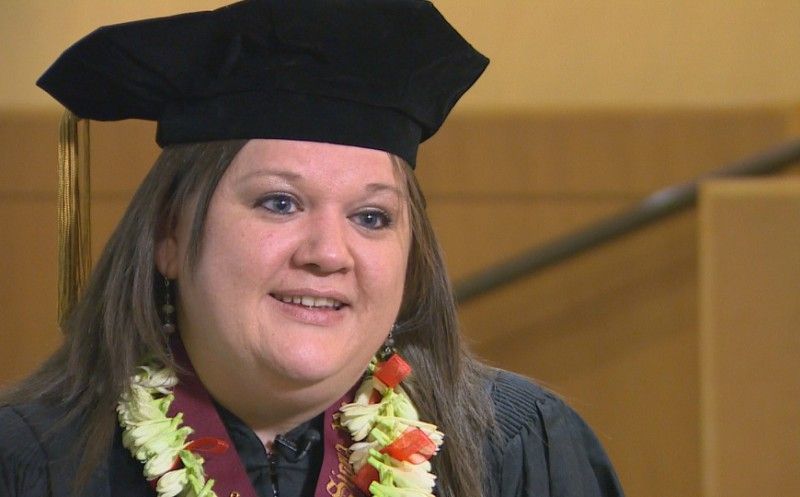Summary: The Washington Supreme Court finally released their opinion of why they allowed a Seattle University law graduate with a rough past to take the bar exam.
Five months ago, the Washington State Supreme Court went against a Washington State Bar Association recommendation to prohibit a Seattle University Law School graduate from taking the bar exam. Instead, the state Supreme Court ruled that graduate Tarra Simmons should have the opportunity to take the exam. The ruling was made five months ago but never explained until now.
The Seattle Times reported on the reasons the court gave for allowing Simmons to take the exam. Simmons, 40, overcame a history of substance abuse and crime before beginning law school. The State Bar questioned her ethics even though she had been sober for over six years.
Simmons grew up in a family with substance-abuse problems surrounded by poverty and crime. During her teenage years, she was a victim of sexual violence and even homeless at times. She resorted to taking part in criminal acts such as stealing, possessing stolen property and second-degree assault. As Simmons grew older, she struggled with addiction. Her conviction in 2001 was for assault and then in 2011 for organized retail theft, unlawful possession of a firearm, and possession of controlled substances. The latest conviction resulted in three years of jail and prison time. She also dealt with two bankruptcies and the foreclosure on her house. She was working as a nurse during her rocky past, resulting in her license being put on probationary status. Despite all of this, Simmons found a way to turn her life around and excel in law school.
The nine-member court’s unanimous decision allowed for Simmons to sit for the bar exam in February. The results of the exam are due April 13. Now the court has released a 33-page opinion written by Justice Mary Yu explaining why they went against the bar association and wanted Simmons to have a chance at the exam.
The opinion stated, “We affirm this court’s long history of recognizing that one’s past does not dictate one’s future.” Yu continued by writing that Simmons received “meaningful treatment” while locked up and “changed her life to a degree that can only be deemed remarkable, both in terms of the efforts she has put forth and the positive results she has achieved.”
Simmons has been very honest about her past, something Seattle University knew fully about upon admitting her to the school. She went on to be the first student at the school to receive a two-year public interest fellowship from a prestigious foundation. Simmons also graduated last year magna cum laude as a dean’s medal recipient. She has completed five internships, of which the supervisors and colleagues referred to her abilities as “excelled and exhibited consistently ethical behavior.”
Despite these positive notes, the Bar Association voted 6-3 to recommend she not be allowed to take the exam which would allow her to obtain a license to practice law. The bar felt that Simmons failed to show her ability to exercise good judgment and conduct herself with a high degree of honesty, integrity, and trustworthiness. They concluded that she failed to present herself in a manner that creates respect for the law and she appeared to act “entitled.”
The court disagreed with their findings, saying Simmons “has attained privileges and recognition beyond the reach of others due to her hard work. She earned everything she has through dedication, talent and a staggering amount of hard work. Simmons rightly takes pride in her extraordinary accomplishments, but there is no evidence that she expects special treatment.”
Yu also pointed out that one of Simmons’ attorneys, Shon Hopwood, is an example of someone who had a criminal past but was allowed by the bar association to take the exam a few years ago. Hopwood served 10 years for bank robbery and using a firearm. He went on to excel in law school and took the exam in 2014. She wrote, “Both Hopwood and Simmons are living examples of a person’s ability to change if she or she has the will and opportunity to do so.”
Seattle University law school dean Annette Clark said Simmons has “proven over and over again that we made the right decision in giving her a second chance. The opinion released by the Washington Supreme Court … thoughtfully articulates the reasons why she should be allowed the opportunity to take the bar exam and become a practicing attorney. It is precisely Tarra’s lived experiences and the way in which she has made restitution and rebuilt her life that makes her such a powerful and passionate advocate for justice-involved individuals who are seeking to re-enter society. I look forward to the proud day when Tarra can take place within the Washington State Bar.”
Simmons has been working for the Public Defender Association doing legislative work while she waits to see if she passed the exam. She said she hopes to work on appellate cases where she can help those like her that need a second chance after serving time behind bars.
Do you think Simmons should have been allowed to take the bar exam? Share your thoughts with us in the comments below.
To learn more about bad law school students, read these articles:
- Law School Student Steals $33K from Student Bar Association
- Law Student Gambles With His Career In Las Vegas By Beheading A Bird: Follow-up
- Former Law Student Sentenced to Four Years for Meth Ring
Photo: king5.com













































